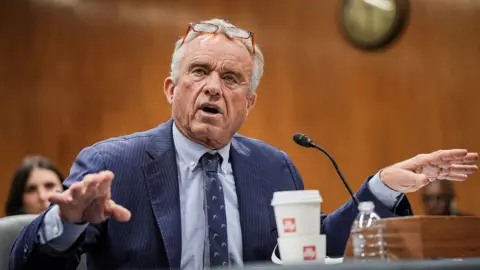RFK Jr sacks entire US vaccine committee
 Reuters
ReutersUS Health Secretary Robert F Kennedy Jr, a vaccine sceptic, has removed all 17 members of a committee that issues official government recommendations on immunisations.
Announcing the move in an editorial in the Wall Street Journal, Kennedy said that conflicts of interest on the Advisory Committee on Immunization Practices (Acip) were responsible for undermining trust in vaccinations.
Kennedy said he wanted to "ensure the American people receive the safest vaccines possible."
Doctors and health experts have criticised Kennedy's longstanding questioning of the safety and efficacy of a number of vaccines, although in his Senate confirmation hearing he said he is "not going to take them away."
On Monday he said he was "retiring" all of the Acip panel members. Eight of the 17 panellists were appointed in January 2025, in the last days of President Biden's term.
Most of the members are practicing doctors and experts attached to major university medical centres.
Kennedy noted that if he did not remove the committee members, President Trump would not have been able to appoint a majority on the panel until 2028.
"The committee has been plagued with persistent conflicts of interest and has become little more than a rubber stamp for any vaccine," Kennedy wrote.
He claimed that health authorities and drug companies were responsible for a "crisis of public trust" that some try to explain "by blaming misinformation or antiscience attitudes."
In the editorial, Kennedy cited examples from the 1990s and 2000s and alleged that conflicts of interest persist.
"Most of ACIP's members have received substantial funding from pharmaceutical companies, including those marketing vaccines," he wrote in the Wall Street Journal.
The move appears contrary to assurances Kennedy gave during his confirmation hearings. Bill Cassidy, a Republican Senator from Louisiana who is also a doctor, reported that he received commitments from the health secretary that Acip would be maintained "without changes."
On Monday, Cassidy wrote on X: "Of course, now the fear is that the Acip will be filled up with people who know nothing about vaccines except suspicion.
"I've just spoken with Secretary Kennedy, and I'll continue to talk with him to ensure this is not the case."
Acip members are required to disclose conflicts of interest, which are posted online, and to recuse themselves from voting on decisions where they may have a conflict.
"The problem isn't necessarily that ACIP members are corrupt," Kennedy wrote. "Most likely aim to serve the public interest as they understand it.
"The problem is their immersion in a system of industry-aligned incentives and paradigms that enforce a narrow pro-industry orthodoxy."
Dr Bruce Scott, president of the American Medical Association, a professional organisation for American doctors, said mass sacking "upends a transparent process that has saved countless lives."
"With an ongoing measles outbreak and routine child vaccination rates declining, this move will further fuel the spread of vaccine-preventable illnesses," Dr Scott said in a statement.
Kennedy did not say who he would appoint to replace the board members. Acip has a meeting scheduled starting 25 June, at which members are scheduled to vote on recommendations for vaccines for Covid, flu, meningococcal disease, RSV and other illnesses.
The BBC contacted the US Department of Health and Human Services and the Acip chair, Dr Helen Keipp Talbot, for comment.
